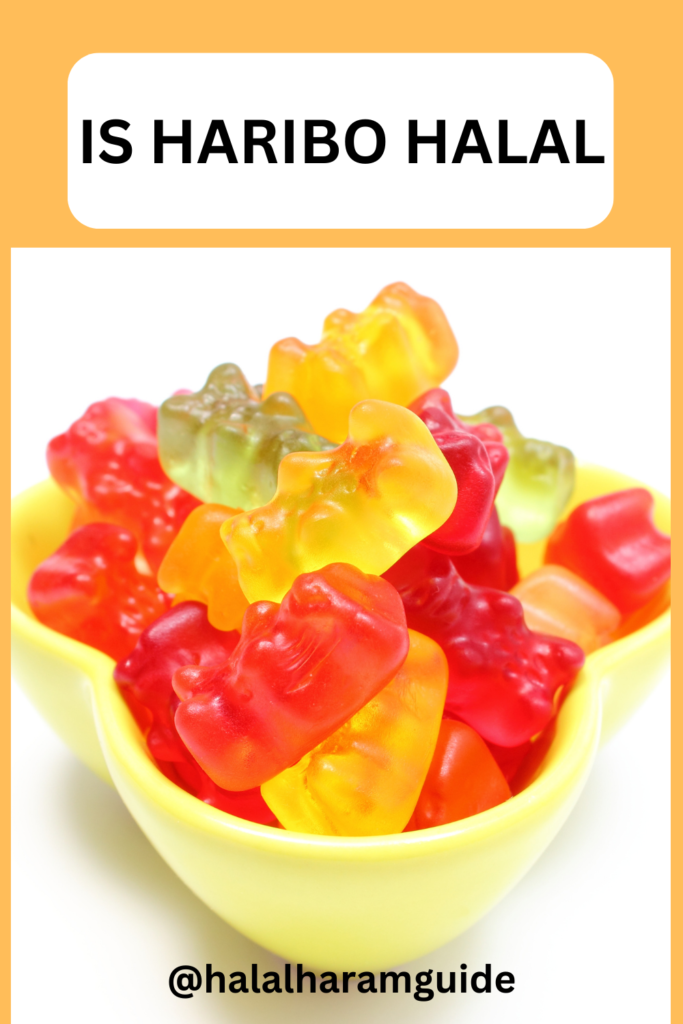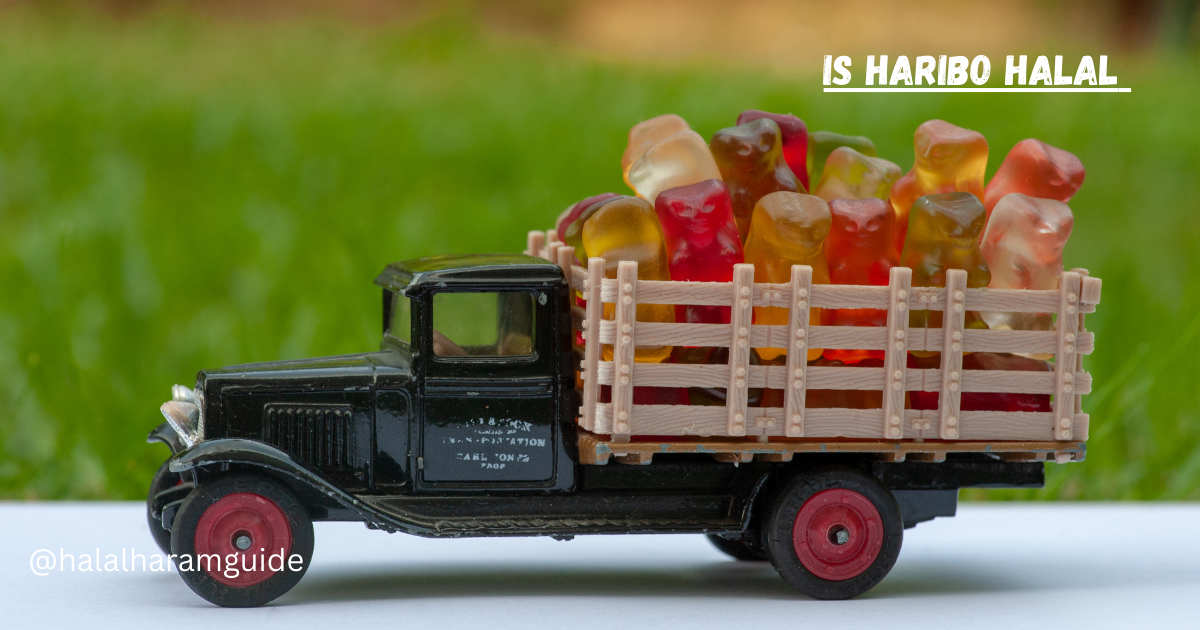Let’s talk about the topic “Is Haribo Halal?”
In the world of confectionery, Haribo has long been a beloved name, known for its irresistibly chewy and flavorful gummy candies. But for those who adhere to a halal diet in accordance with Islamic dietary laws, the question arises: Is Haribo halal?
In this blog post, we embark on a delightful journey into the world of Haribo sweets, unraveling the halal status of these iconic treats. We’ll delve into the ingredients, manufacturing processes, and factors that determine whether Haribo can be a delightful addition to a halal-conscious diet.
Whether you’re a gummy enthusiast or simply curious about halal candy options, read on to satisfy your sweet tooth while adhering to your dietary preferences.
What is Haribo?
Haribo is a well-known German confectionery company that specializes in the production of gummy candies and other sweet treats. The company was founded in 1920 by Hans Riegel in Bonn, Germany. Haribo is famous for its wide range of gummy candies, which are sold under various brand names and in numerous shapes and flavors. Some of their most popular products include gummy bears, gummy worms, gummy rings, and many more.
One of Haribo’s most iconic products is the “Goldbears” gummy bears, which are available in multiple colors and flavors. Haribo candies are known for their chewy and fruity texture, making them a favorite among candy enthusiasts of all ages.
Haribo has expanded its operations globally and has a presence in many countries, offering its sweet treats to a diverse international audience. The company’s slogan, “Haribo macht Kinder froh und Erwachsene ebenso” (Haribo makes children happy, and adults too), reflects its broad appeal.
Is Haribo Halal or Haram?
Haribo, like many confectionery companies, produces a wide range of products, and the halal or haram (permissible or forbidden) status of their candies can vary depending on the ingredients used and the production methods employed for each specific product.
The primary concern for Muslims when determining the halal status of Haribo candies is the source of gelatin. Gelatin is a common ingredient in gummy candies, including many Haribo products. Gelatin can be derived from either halal or non-halal sources. Traditionally, it has often been sourced from non-halal animals, such as pigs.
To address this concern, some Haribo products, especially those intended for Muslim markets or countries, may use halal-certified gelatin or alternative gelling agents. These products are labeled as “halal” and have certification from reputable Islamic organizations.
To know whether a specific Haribo product is halal or not, you should:
Check the Packaging: Look for any halal certification logos or labels on the product packaging. These certifications indicate that the product meets Islamic dietary standards.
Read the Ingredients List: Examine the list of ingredients on the packaging. Look for the source of gelatin. If it’s from a halal source or if the product uses alternative gelling agents, it may be considered halal.
Contact the Manufacturer: If you’re uncertain about the halal status of a particular Haribo product, you can contact the manufacturer directly to inquire about the ingredients and their sourcing.
It’s important to note that not all Haribo products are necessarily halal, and the halal status can vary among different varieties and regions. Therefore, it’s recommended for Muslims to be diligent in checking product labels and certifications to ensure they are consuming Haribo candies that align with their dietary preferences and religious beliefs.
What are the ingredients used in Haribo?
The specific ingredients in Haribo candies can vary depending on the product and its flavor. However, here are some of the common ingredients you might find in Haribo gummy candies:
Glucose Syrup: A sweet syrup derived from starch, often used as a sweetener and to provide the gummy texture.
Sugar: A common sweetening agent.
Gelatin: Gelatin is used to give gummy candies their chewy texture. The source of gelatin can vary, and it may be derived from animal sources (such as pigs) or alternative sources. Some Haribo products use halal-certified gelatin or vegetarian alternatives.
Citric Acid: This adds tartness and acidity to the candy, enhancing its flavor.
Artificial and Natural Flavors: These ingredients provide the various fruit flavors in the candies.
Fumaric Acid: Fumaric acid is another acidulant used to give gummy candies a sour taste.
Dextrose: A type of sugar often used in candies.
Corn Starch: Used as a thickening agent to help form the candy’s shape.
Artificial Colors: Various food colorings are used to create the bright and colorful appearance of the candies.
Palm Oil: Some gummy candies, including Haribo products, may contain palm oil as an ingredient.
It’s important to note that the specific ingredients and their proportions can vary between different Haribo products and flavors. If you have allergies or dietary restrictions or are concerned about the halal status of a specific product, it’s advisable to check the product packaging for detailed ingredient information and to look for any relevant certifications or labels.
Is gelatin used in Haribo?
Yes, gelatin is commonly used in many Haribo gummy candies to give them their chewy texture. However, the source of gelatin can vary, and it may be derived from animal sources (such as pigs) or alternative sources.
Some Haribo products use halal-certified gelatin or vegetarian alternatives for individuals with specific dietary preferences or restrictions.
To determine whether a specific Haribo product contains gelatin and, if so, the source of gelatin used, you should check the product’s packaging and ingredient list.
Additionally, if you have concerns about the type of gelatin used, you can contact the manufacturer directly for more information.
How do i know if my Haribo is Halal?
To determine if a specific Haribo product is halal (permissible), you should follow these steps:
Check the Packaging:
Look for any halal certification logos or labels on the product’s packaging. Halal-certified products will typically display such certification to indicate that they meet Islamic dietary standards.
Read the Ingredients List:
Examine the list of ingredients on the packaging. Pay particular attention to the source of gelatin, which is a common concern for Muslims. If the gelatin used in the product is from a halal source or if the product uses a halal-certified alternative gelling agent, it may be considered halal. Some products may explicitly state “halal gelatin” or “vegetable gelatin.”
Contact the Manufacturer:
If you are uncertain about the halal status of a specific Haribo product, you can contact the manufacturer directly. They may be able to provide you with detailed information about the ingredients and their sourcing.
Research Online:
Some online databases and websites provide information about the halal status of various food products, including candies like Haribo. You can search for specific product names or types to see if they are listed as halal.
Consult with Islamic Authorities:
You can consult with your local Islamic scholars, organizations, or religious authorities for guidance on whether specific Haribo products are considered halal.
It’s important to remember that not all Haribo products are necessarily halal, and the halal status can vary among different varieties and regions. Therefore, it’s essential to be diligent in checking product labels and certifications to ensure you are consuming Haribo candies that align with your dietary preferences and religious beliefs.
Does Horibo use pork or beef gelatin?
Haribo, like many confectionery companies, typically does not disclose the specific source of gelatin (whether pork or beef) used in its products on the packaging or publicly. The source of gelatin can vary depending on the region and the specific product.
For consumers with dietary restrictions, especially those following halal or kosher dietary guidelines, it’s essential to verify the source of gelatin in each Haribo product individually. To do so:
Check the Packaging: Examine the product’s packaging for any information related to the source of gelatin. Some Haribo products may specify whether they use pork gelatin or other alternatives.
Contact the Manufacturer: You can contact Haribo directly through their customer service channels or website to inquire about the source of gelatin used in a particular product. They may provide you with more specific information.
Halal or Kosher Certification: Look for products with reputable halal or kosher certification. These certifications often ensure that the ingredients, including the source of gelatin, meet specific dietary standards.
Online Resources: Some online databases or forums may provide information about the source of gelatin in specific Haribo products based on user experiences and research.
Due to the variability in gelatin sourcing, it’s essential to verify the status of each product you intend to consume, especially if you have specific dietary preferences or restrictions.
FAQ’s
Which Haribo is not halal?
The halal status of Haribo products can vary depending on the specific ingredients and sourcing of gelatin. Not all Haribo products are necessarily halal, especially those containing non-halal gelatin (derived from pork). To determine whether a particular Haribo product is halal or not, you should check the packaging for halal certification or inquire with the manufacturer regarding the source of gelatin and other ingredients.
Is gelatin haram in Islam?
Gelatin itself is a complex topic in Islamic dietary laws. Whether gelatin is considered halal or haram depends on its source and the method of extraction. Gelatin derived from non-halal animals, particularly pigs, is considered haram. However, gelatin can also be sourced from halal animals or plant-based alternatives, making it halal. The key is to know the source of the gelatin used in specific products.
Is gelatin in Haribo halal?
The halal status of the gelatin used in Haribo products can vary. Some Haribo products may use non-halal gelatin, while others use halal-certified gelatin or vegetarian alternatives. To determine the halal status of a specific Haribo product, you should refer to the product’s packaging, contact the manufacturer, or look for halal certification.
Can Muslims have Haribo sweets?
Muslims can consume Haribo sweets if they are made with halal-certified ingredients, including halal gelatin or alternatives, and if they meet Islamic dietary standards. It’s crucial for Muslims to verify the halal status of each specific Haribo product to ensure it aligns with their dietary preferences and religious beliefs.
Does Haribo contain pork gelatin?
Some Haribo products may contain gelatin derived from non-halal sources, including pigs. To know whether a specific Haribo product contains pork gelatin or not, you should check the product’s packaging for ingredient information and source disclosures. If you are uncertain, contacting the manufacturer directly can provide more clarity.
- “Is Lobster Halal? Understanding Its Permissibility”
- “Is Drawing Haram in Islam? Understanding the Perspective”
- “Is Fermented Kimchi Halal? Exploring Kimchi’s Halal Status”
- “Is Collagen Halal? Unveiling the Halal Status of Collagen”
- “Is Wine Vinegar Halal? Unveiling Its Permissibility”


